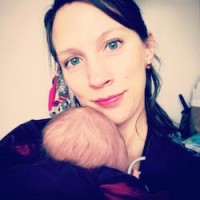I don’t care that you think I technically can’t write—and other famous writers would agree.
I don’t have a formal education in writing. Do I consider this to be problematic? Eh, not really.
For instance, I’ve learned the associated press style along the way—a necessity for journalists—and after I’d already landed a job writing for a newspaper, with my handy AP Style Guide by my side.
I’ve also been reminded by amazing editors of the trickier ins and outs of punctuation. (And we’re not supposed to use the word amazing by the way.)
Additionally, my library of writers has been collected purely based on interest and independent research rather than college professor suggestions.
My more literary-minded friends, however, frequently post articles and status updates on Facebook about (in)famous writers who can’t write (a few of those I’ve seen mentioned are some of my favorites) or words you should never, ever use (like ever).
On the other hand, I feel lucky that I don’t give a flying f*ck about using “incorrect” wording—the kind that supposedly equals crappy writing.
Nope, I’m inspired by words like just, quite and perhaps—you know, those words that “educated” writers shun.
Yet here’s the thing: I truly believe that my writing hits a chord with my readers because of this, not in spite of it.
And it’s not that I’m unafraid to have my own style, it’s that I have no choice—I’m not “properly” schooled enough to be any other way.
Initially I did feel the need to justify my style—my personal attraction to semi-colons and “improper” sentence structures—and then somewhere along the way I forgot the chip on my geology-degreed shoulder and I simply wrote.
So I’d like to share with you a little list that’s filled with other writers who did exactly this: they just wrote regardless of what their degrees were labeled, or whether or not they even had one at all. Because the truth is that some of the best writers in history—and some of my private heroes—didn’t even finish high school, much less attend university.
In no particular order, here are 11 writers—who you’ve probably heard of—without formal educations:
1. Harper Lee
She might have been a precocious reader, but she dropped out of law school to pursue her writing dreams.
2. Charles Dickens
His private education ended when his father was sent to debtors prison when Dickens was only 12. Eventually he did go back to school for a brief time, but he then left to become a clerk in a solicitor’s office. (And his father’s time in jail—and his own subsequent abandonment—followed Dickens through many of his characters.)
3. Jack Kerouac
Believe it or not, Kerouac was a high school jock—a football star. His athletic ability earned him a scholarship to Columbia University, but disagreements with his coach, time benched on the sidelines and a cracked tibia all led to his dropping out.
4. Mark Twain
Samuel Clemens also left school at the age of 12, when his father died. He was introduced to the world of writing through his apprenticeship with an older brother, a printer.
5. George Bernard Shaw
He dropped out of school at 14, finding little value in formal education. Instead, he chose to write on his own.
“Schools and schoolmasters, as we have them today,” he once wrote, “are not popular as places of education and teachers, but rather prisons and turnkeys in which children are kept to prevent them disturbing and chaperoning their parents.”
6. H.G. Wells
Wells left school at the tender age of 11 when his professional cricket player father fractured his thigh. This loss of the family’s main source of income forced the children to take on apprenticeships. Wells hated it and, like Dickens, his experiences later inspired his writing.
7. Jack London
London began a series of odd jobs starting at age ten. By 13 he quit school, kept working, and read voraciously. His first collection of short stories was published at age 24.
8. Michael Crichton
Crichton was actually extremely educated—just not in the field of literature. He graduated summa cum laude from Harvard College, receiving his MD from Harvard Medical School. He might have chosen to pursue a career as an author, but his medical knowledge came in handy for books like Jurassic Park, a novel about genetic research.
9. John Grisham
Grisham changed colleges three times before completing a degree—in accounting. He later earned a JD degree—an education that served him well as a bestselling author of legal thrillers.
10. JK Rowling
According to her website, Rowling attended Exeter University, “where she earned a French and Classics degree, her course including one year in Paris. As a postgraduate she moved to London and worked as a researcher at Amnesty International among other jobs. She started writing the Harry Potter series during a delayed Manchester to London King’s Cross train journey, and during the next five years, outlined the plots for each book and began writing the first novel.”
11. Kurt Vonnegut.
Vonnegut’s formal education was in biochemistry and he also obtained a Master’s degree in anthropology.
“I’m on the New York State Council for the Arts now,” he told The Paris Review, “and every so often some other member talks about sending notices to college English departments about some literary opportunity, and I say, ‘Send them to the chemistry departments, send them to the zoology departments, send them to the anthropology departments and the astronomy departments and physics departments, and all the medical and law schools. That’s where the writers are most likely to be… I think it can be tremendously refreshing if a creator of literature has something on his mind other than the history of literature so far. Literature should not disappear up its own asshole, so to speak.”
Want 15 free additional reads weekly, just our best?
Get our weekly newsletter.
Editor: Catherine Monkman
{Photo: CBC News.}











Read 3 comments and reply